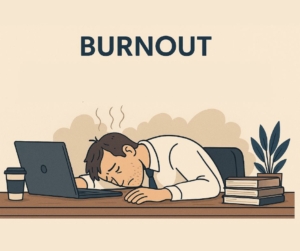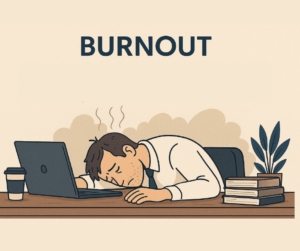How Burnout Occurs and How to Overcome It, According to a Psychology Lecturer at Unisa Yogyakarta
Burnout, or a psychological condition that arises from prolonged stress due to emotional exhaustion from work or studies, often affects the current generation. Komarudin, a psychology professor at Universitas ‘Aisyiyah (Unisa) Yogyakarta, explains how burnout can occur and shares tips for students to avoid experiencing burnout.
Komar explains that there is a difference between burnout and stress. Stress can be positive or negative; it is something that every human being naturally experiences. If managed effectively, it can serve as motivation to achieve something, which is referred to as eustress. “Burnout, on the other hand, results from accumulated distress that ultimately leads to emotional exhaustion and despair in pursuing goals,” Komar stated on Saturday (August 2, 2025).
He mentioned several factors that cause students to experience burnout. These range from internal and external factors. Internal factors are more related to the students themselves, such as a lack of resilience in facing challenges, weak grit/determination, lack of discipline, procrastination, overthinking, poor stress coping skills, or a lack of communication skills.
“Meanwhile, external factors are factors that originate from outside, such as not having enough money to continue studying, being broken up with by a boyfriend or girlfriend so you don’t feel motivated to do anything, or having unhealthy friends. In addition, there are uncooperative mentors, or campus regulations that change frequently and make things difficult for students,” said Komar.
Komar explained that according to the WHO, there are several characteristics of burnout, including sleep disorders, decreased immunity/susceptibility to illness, and withdrawal from social environments. Then, there is an increase in maladaptive behavior (e.g., substance abuse, doomscrolling that consumes a lot of time), and feeling overwhelmed by tasks. “Or, at a glance, they appear physically and mentally unhealthy, characterized by avoidance and despair,” he said.
What are the long-term effects if burnout is not recognized or addressed? According to Komar, depersonalization in burnout causes students to become apathetic toward the campus environment and withdraw from social settings. In the long term, if burnout is not addressed promptly, it can hinder personal development. “People who experience burnout usually also experience symptoms of anxiety, and if these accumulate without a solution, it will certainly lead to depression,” said Komar.
How to Overcome Burnout?
Komar said that if you start to feel burned out, you can look for appropriate coping strategies, such as problem-focused coping. “This coping strategy has been shown to be effective in several studies by staying focused on goals and planning alternative solutions to problems, and not closing yourself off from seeking social support,” Komar advised.
Komar said that grit or resilience can be built by strengthening two dimensions, namely having persistence in trying, so that when facing any problem, you remain calm and never give up. “Second, consistency of interest by reflecting on the original purpose of studying, why you have to study, who you are studying for, and so on, all of which boil down to focusing on the original goals that you wanted to achieve and now have to fight for again,” said Komar.
Komar said it is important for students to learn time and emotion management from the beginning of their studies. With good time and emotion management, students will be more disciplined in pursuing their goals, thus avoiding the accumulation of burdens at a certain time that will trigger burnout.
He advised final-year students in particular to complete what they have started. “God has beautiful surprises for every prayer that is offered. There will definitely be a time when everything that has been worked for will be completed,” said Komar.
Komar revealed that campuses also play an important role in overcoming burnout. Campuses need to establish regulations that are consistent and not confusing for students, so that students are prepared to complete their final assignments in the middle of the semester. Meanwhile, lecturers must update their skills in providing services to students because the generation they are dealing with today may be different from the generation they experienced in the past. They must be more discerning in recognizing the characteristics of their students so that they can use various appropriate approaches.















